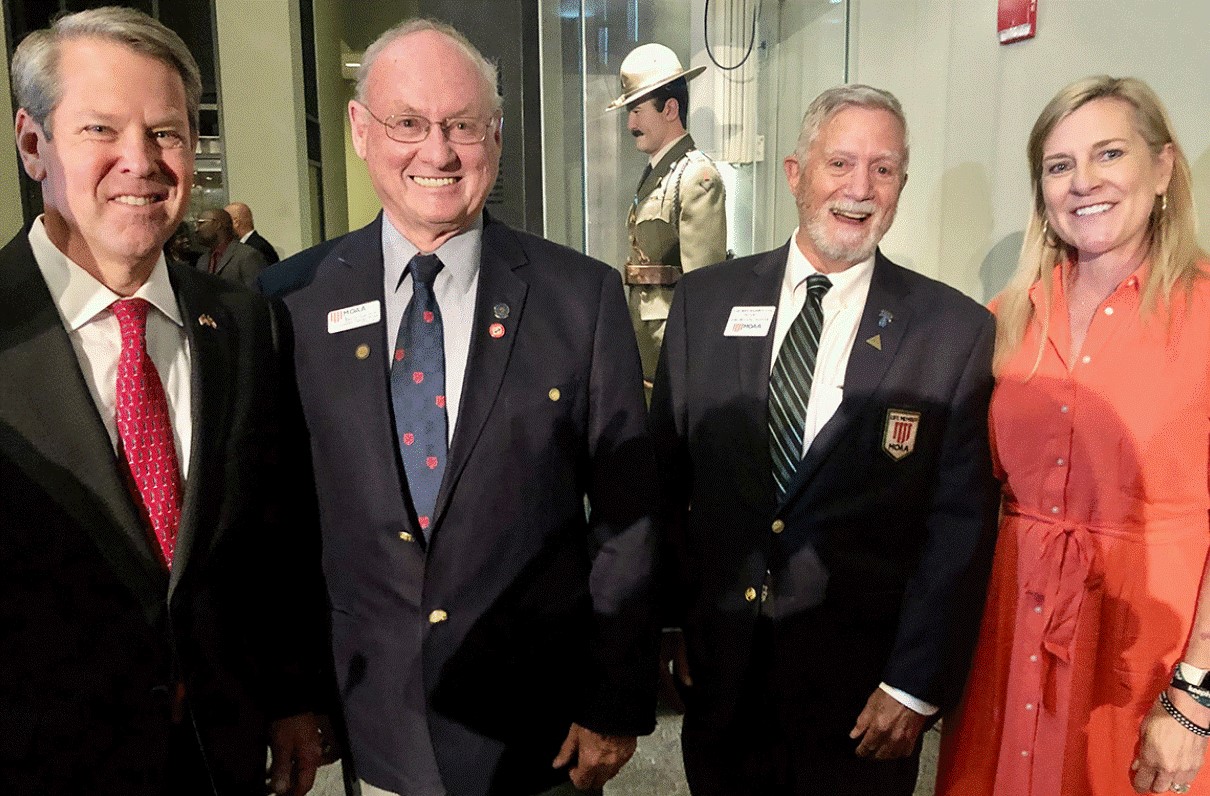Is your state still fully taxing retirement pay? MOAA National serves in an advisory capacity for state-specific issues such as income tax exemption. Please contact your local MOAA council as state legislation must originate at the state level.
Military retirees in three states soon will be eligible for significant tax breaks, with South Carolina and Oklahoma exempting all military retirement income from state taxes, and Georgia exempting a portion of that income for residents under age 62.
MOAA members and affiliates took part in some of the lobbying efforts to secure these new provisions. Here’s an update on these new laws, as well as work underway in Rhode Island on similar tax relief.
[RELATED: MOAA's Military State Report Card and Tax Guide]
South Carolina
Gov. Henry McMaster signed H. 3247 into law on May 13, exempting all military retirement income from South Carolina taxes beginning with the 2022 tax year. The South Carolina Veterans Coalition members from the S.C. VFW, S.C. DAV, S.C. AUSA (Columbia and Charleston), S.C. Marine Corp League, S.C. ROA, S.C. Navy League, S.C. AMVETS, and S.C. Council MOAA members, spearheaded the advocacy efforts in support of the change.
“It has been an eight-year journey. It’s a hallelujah day for us,” said Col. Tom Robillard, USAF (Ret), who serves as the vice president for legislative affairs for both MOAA’s South Carolina Council of Chapters and the Columbia Chapter. Robillard also co-founded MOAA’s State Legislative Forum, which allows state-level advocates to discuss experiences and best practices.
[RELATED: MOAA Changemaker 2020: Tom Robillard]
Robillard said a combination of factors led to the legislative victory. The timing was good -- the state was experiencing an excess of funds and had created a new tax on internet sales. And while that played a role, Robillard said a unified drumbeat from nine veterans service organizations made this a reality. In terms of strategy, he said one-on-one meetings between legislators and their constituents proved critical to convey the message.
Robillard said Council President Maj. Gen. Michael Akey, USAF (Ret), and Council Vice President Linda Caldwell, a former Army captain, led the way.
"We are just so thrilled for our fellow veterans that they have this long-awaited exemption,” Caldwell said, adding that this move will keep military retirees in the state. “This is just a huge plus for South Carolina, which is an awesome place to live.”
Robillard said the bill also benefits survivors, although it does not include nonmilitary uniformed services personnel. “That’s probably another battle down the line,” he said.
Oklahoma
Oklahoma Gov. Kevin Stitt signed a bill May 26 granting full exemption on military retirement pay.
SB 401 takes effect beginning with the 2022 tax year and would expand the state’s existing tax break for military retirees, which covers 75% of their earnings.
“We’re thrilled about it,” said Lt. Col. Ed Petersen, USAF (Ret), president of MOAA's Oklahoma Council of Chapters. “Looking at the number of surrounding states that already had this it was pretty obvious it needed to be done.”
State Sen. Adam Pugh, a former Air Force officer and a member of the senate since 2016, told the Tulsa World the bill would attract “highly trained professionals” to the state to “help fill the gap in critical industries like aviation and engineering, which will be an incredible boon for our economy.”
Petersen, at risk of sounding like the Chamber of Commerce, noted the state already had clean air, clear skies, cosmopolitan cities, a low cost of living, and friendliness to spare.
“Bottom line, this is just another item on the list,” Petersen said of the new exemption. “And one that might tip Oklahoma in favor.”
[RELATED: Check Out This Ranking of the Best (and Worst) States for Military Retirees]
The bill does not cover members of the commissioned corps of the U.S. Public Health Service or NOAA.
Georgia
Less than a month before the South Carolina law took effect, Georgia Gov. Brian Kemp signed a law exempting up to $35,000 of military retirement income from state taxes for state residents under age 62. All residents are eligible for a $17,500 military retirement pay exemption, while those declaring Georgia-earned income up to $17,500 can declare an additional amount equal to the income claimed.
Georgia residents ages 62 to 64 can claim a $35,000 exemption on any type of retirement income, while those over 65 can exempt $65,000.
The Georgia law takes effect for the 2022 tax year.
“It was a long, hard battle, but it worked out,” said Lt. Col. Barry Gardner, USA (Ret), president of MOAA’s Georgia Council of Chapters. “Every chapter talked to their state rep, their state senator and push this, stressing the brain drain.”
Gardner gave special praise to Georgia Council legislative chair Col. William "Les" Arent, USAF (Ret), who "herded from the council level."
"He's been working this legislative affairs thing for a good seven, eight years," Gardner said. "He’s always been right there with us."
Gardner said the tax break sends a message to newly retiring military based at Georgia installations.
“You’ve served here in Georgia, and now is your chance to continue serving in the state and contribute your expertise in the state,” he said.
The bill does not address survivor benefits and does not cover members of the commissioned corps of the U.S. Public Health Service or NOAA.
Virginia
Virginia state lawmakers approved the state budget Wednesday evening and with it came a new tax exemption for military retirees.
Under the new law, which still requires a governor’s signature, military retirees age 55 or older will receive the benefit. It will be phased in beginning in tax year 2022. Taxable military retirement pay will be reduced by $10,000 in the first year and progress in $10,000 increments to a maximum of $40,000 in 2025.
“We’re very pleased that we have a real benefit now in the state of Virginia,” said Col. Monti Zimmerman, USA (Ret), vice president of legislative affairs for MOAA’s Virginia Council of Chapters. “The only thing we would like to see happen is reduce that age 55 to age 50 or no age requirement at all.”
While the exemption is not yet official, Gov. Glenn Youngkin touted a partial exemption to military retiree income during his campaign.
When combining Virginia’s additional tax breaks for those age 65 and older, such as zero tax on Social Security, some military retirees will be approaching zero tax, Zimmerman estimated.
“It’s going to be quite the total benefit for someone who is a military retiree,” he said.
The benefit only applies to members of the armed forces, so USPHS and NOAA members would not receive the benefit. Survivors of armed forces retirees will receive the exemption.
Rhode Island
The FY 2023 Rhode Island state budget proposal includes a phased approach to exempting military retirement pay, beginning with a 20% reduction for the 2023 tax year.
The exemption would increase an additional 20% until the 2027 tax year, when the full amount would be covered. Gov. Dan McKee included the change in his proposal, which is now in the state house (H 7123) awaiting consideration.
The measure would not address USPHS or NOAA income, nor would it affect survivor benefits. Rhode Island has no military retirement-specific tax breaks on the books, though taxpayers over 65 are able to exempt a portion of their income if overall income levels fall below a given threshold -- $87,200 for individual filers in 2022. Learn more about the exemption at this link (PDF).
Want to Help Servicemembers in Your Community?
Learn how you can make a difference with your local chapter.

